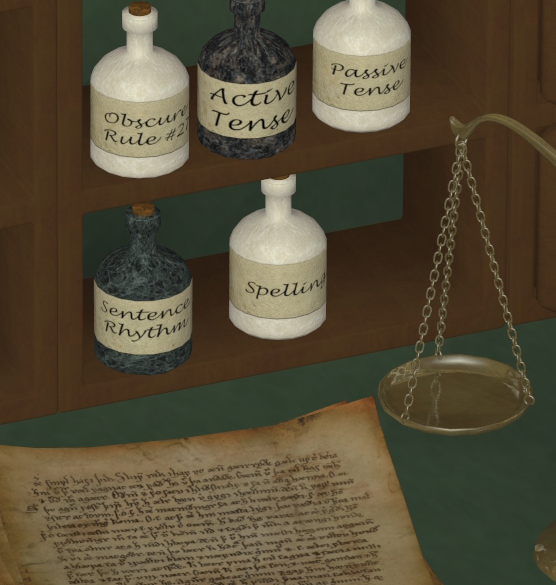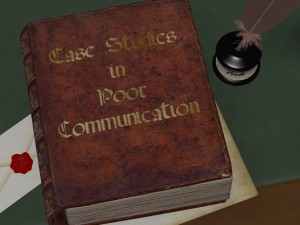Over the last 3 months I’ve been trying to improve the content of my blog, both the pictures I use to illustrate my articles and the quality of my writing. As I expected, Poser has helped me to improve my pictures. I’m starting to understand the shortcuts and tricks that make a picture look real. The two pictures below were both used to illustrate articles in my blog. There’s about six months of experience between the two pictures.
The Texas History was created using a fairly simple cut and paste technique, allowing for very few modifications. The Case Studies picture was created as a 3D model in Poser, allowing me to simulate gold foil letters and even add the ink bottle and quill.
The time to do both pictures was approximately equal but I tend to like the picture on the right better. The book looks more realistic, the ink and quill fit my logo and the letter adds to the look of a desk. More detail and more that looks like we expect it to.
I wish it were that simple to see improvement in my writing. I can look at the words I use, I can look at my sentence structure, I can look at my topics and except for easily being able to determine when to use chose and choose, thanks Mom, I can only say I usually spell my words correctly.
As I was trying to make sense of yet another book on improving my writing I made a connection. Not quite an epiphany, more like an “ah ha” moment. It’s not going to improve my writing overnight. It may not improve my writing at all. There can be entire continents between understanding and implementation. I’m sharing this with you because you are a very important part of the implementation.
There are a lot of rules and guidelines to improving your writing. One of the common ones is always write in the active tense not in the passive tense. Even Microsoft Word will tell you to change your tense. Why? I like my passive tense sentences.
Vary your sentence/paragraph length, use strong words, use strong leads, avoid repeating words, use proper punctuation and several thousand more guidelines. Some of the rules contradict others. Even if I am scrupulous about each rule that applies to my current topic, it’s not a given that people will like it.
In How Do I Know If An Engineer Loves Me, I postulated an algorithm for love.
If sum of all desirable_qualities > love_threshold
then love = TRUE
I realized I could modify the algorithm to read;
If sum of all like_qualities – sum of all dislike_qualities > like_threshold
then like= TRUE
This means that rule number one is know your audience and write to your audience. Even when I don’t understand or appreciate the why that rule exists, enough people find its implementation pleasing that my overall score will improve. My audience is deciding what they like and dislike. Unfortunately for me, you, the reader, don’t always recognize the attributes you find pleasing nor can I determine the relative importance you place on each rule.
Do I get more points if I always use active tense or if I always put commas in the right place? Pardon me for saying it but I don’t think you know either and you’re doing the scoring.
I also believe that, like cooking, some rules work best when used in conjunction with others and some rules should never be combined. It’s all about personal taste.
This probably isn’t anywhere near the revelation to you as it is to me but as I keep it focused in my mind it allows me to accept the guidelines, and incorporate them in my writing, even though I don’t understand why you care about my verb tense.
Oh, a small favor please. Since you’re doing the scoring, how about letting me know how I’m doing every once in a while? It’s greatly appreciated.
© 2013 – 2019, Byron Seastrunk. All rights reserved.














As I see it, “rules” actually make more sense when you have figured out what generation is “judging” them.
I like most of your work, and even though at least one member or your reading audience is going to object, I really don’t notice syntax.. I do, however notice spelling!
You are doing well..IMHO..
Well, just remember e. e. cummings…he broke all of the rules and people loved him anyway. IMHO – the rules today are for English teachers and students. At one time, the ability to use “the rules” demonstrated your class status because only the weathy were educated. “The rules” also seem to be quite fluid – loosening up and evolving as our language becomes less formal. Now, “the rules” support a general impression of professionalism in an academic or business document. Following the rules of grammer does not necessarily make for interesting reading material. So, if your intent is to serve as supplemental reading material in a classroom – please work on your syntax. If, however, your intent is to educate and entertain those of us less logical than an engineer…you are doing just fine!